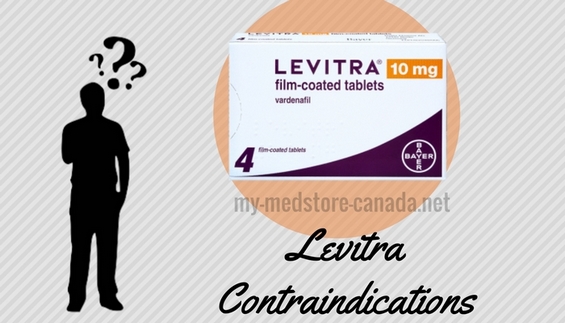Levitra Contraindications
 The absolute contraindications for Levitra:
The absolute contraindications for Levitra:
- Hypersensitivity to any component of the drug;
- Simultaneous use with nitrates or drugs, which are nitric oxide donators;
- The combination with the active or moderately potent inhibitors of CYP3A4, such as ketoconazole, itraconazole, ritonavir, indinavir, erythromycin, and clarithromycin;
- Therapy with other drugs for erectile dysfunction treatment;
- Men who are contraindicated sexual activity (eg, patients with an underlying cardiovascular disease such as unstable stenocardia or congestive heart failure (class III or IV according to the classification of the New York Heart Association).
Safety of Levitra (Vardenafil) has not been studied and there are relevant data so far. Therefore, this drug is not recommended in patients with the following conditions:
- Severe hepatic dysfunction;
- Kidney disease in the terminal stage, requiring dialysis;
- Hypotension (Recent myocardial infarction or stroke (during the last 6 months);
- Unstable stenocardia and hereditary degenerative retinal disorders such as retinitis pigmentosa.
Caution to Avoid Side Effects

- Patients with anatomical deformation of the penis (curved penis, cavernous fibrosis, Peyronie’s disease);
- Diseases predisposing to priapism (sickle-cell anemia, multiple myeloma, leukemia);
- Patients with a tendency to bleeding and exacerbation of peptic ulcer disease should take vardenafil only after assessment of the benefit-risk relation.
Before Taking Levitra
- You should not use this drug if you are allergic to Vardenafil;
- Do not take Levitra if you are currently using the medication based on nitrates to treat chest pain or heart problems. These drugs include nitroglycerin, isosorbide dinitrate, and isosorbide mononitrate. Nitrates are also found in some recreational drugs such as amyl nitrate or amyl nitrite ( “poppers”). Combination of vardenafil with medicines containing nitrates can cause a sudden and serious decrease in blood pressure.
Make sure that Levitra is safe for to you, tell your doctor if you have experienced one of these following conditions:
- Heart disease or heart rhythm problems, coronary artery disease;
-
 Recent heart attack, stroke or congestive heart failure in the last 6 months;
Recent heart attack, stroke or congestive heart failure in the last 6 months; - Long QT syndrome (in you or members of your family;
- High or low blood pressure;
- Convulsions;
- Liver or kidney disease (dialysis);
- Blood diseases such as sickle cell anemia, multiple myeloma or leukemia;
- Bleeding disorder such as hemophilia;
- Stomach ulcer;
- Problems with hearing or vision, eyesight loss episodes;
- Eye diseases such as retinitis pigmentosa (an inherited condition of the eye);
- Physical deformity of the penis (for example, Peyronie’s disease);
- You have been contraindicated sexual activity for some health reasons.
Levitra 20 mg can decrease blood flow to the optic nerve of the eye, causing sudden vision loss. This occurred in a few people taking this drug, most of whom had heart disease, diabetes, high blood pressure, high cholesterol or certain pre-existing eye problems, and in those who were smoking and over the age of 50. It is not defined whether this medication cause eyesight loss. Stop taking the drug and seek emergency medical help if you have sudden eyesight loss.







